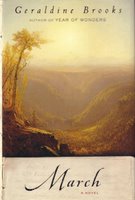 44. March, Geraldine Brooks. Fiction, 5-10, p. 273
44. March, Geraldine Brooks. Fiction, 5-10, p. 273 I’ve never read Little Women. The window of opportunity for me to read Alcott’s classic novel would have been in the mid ‘60s and no respectable male teen or pre-teen of that era was going to read a novel with such a title.
It’s the same sensibility that led her publishers to suggest that Janice Rowling publish under the sobriquet, J.K. Boys, of a certain age, simply don’t read books by women. My J.K. Rowling was Andre Norton. I didn’t learn that Andre was
All this is a roundabout introduction to Geraldine Brooks’ 2006 Pulitzer Prize winner, March, which extrapolates passing events from Little Women into a full-fledged novel. Brooks even furnishes us with a back story on one of Alcott's minor characters – more on that later.
In many respects – and certainly in those that are most important – March has nothing to do with Little Women in the way that The Jane Austen Book Club did with Austen and her works. The Jane Austen Book Club was an affectionate tribute to Austen as well as a tender and amusing examination of the trials and tribulations of contemporary romance.
March isn’t tender or amusing. It’s a dark, brooding novel that explores the brutality inflicted on Blacks before and during (and one can only assume after) the Civil War and the stark absence of understanding that can occur between a husband and wife, who may dearly love one another, but make unfortunate assumptions about one another’s desires.
March focuses on Mr. March, the sire of those darling little women, who is limited to a cameo in Alcott’s novel.
The bulk of the novel is given over to March’s Civil War experiences, which, not to put to fine a point on it, don’t go well. As for the back story, it’s critical to understanding this principled, but hapless man, who is viewed by his own wife as an “inconstant, ruined dreamer.”
As a callow youth, March tromped through
A man of extremes, especially for his time, Marsh is a vegetarian (he eschews milk because it belongs to the calf), a guide on the Underground Railroad, a financial underwriter of John Brown’s ill-starred ventures and an unconventional minister of religion. But when tested under the greatest of extremities, Marsh learns that principle and action do not always find accord.
March is an insightful, powerful book and elegantly written, but it is not an enjoyable read in light of the unrelenting brutality of slavery, war and marital misunderstanding.


No comments:
Post a Comment